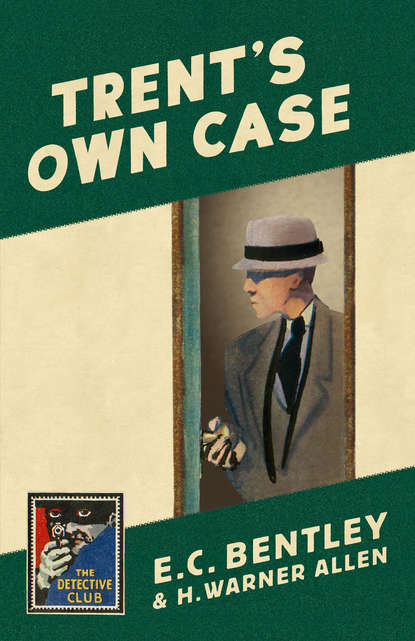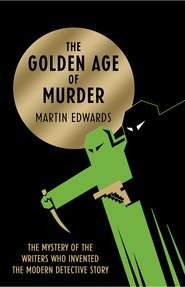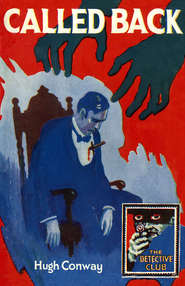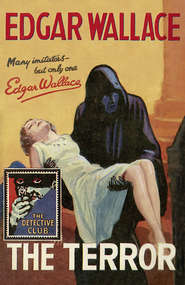По всем вопросам обращайтесь на: info@litportal.ru
(©) 2003-2024.
✖
Trent’s Own Case
Автор
Год написания книги
2019
Настройки чтения
Размер шрифта
Высота строк
Поля
CHAPTER III (#u52dfecca-2132-58a0-8321-f15f3225d767)
DEATH OF A PHILANTHROPIST (#u52dfecca-2132-58a0-8321-f15f3225d767)
TO Chief Inspector Gideon Bligh’s experienced eye the scene explained itself—up to a point. That able officer stood in the centre of the late James Randolph’s bedroom on the upper floor of No. 5, Newbury Place, known to a simpler age as Newbury Mews. This was a small enclosure, approached by archways from the streets at either end of it, in one of the purlieus of Park Lane; No. 5 being the nearest to Bullingdon Street of the neat row of stables and coach-houses, converted now to the uses of well-to-do human habitation.
Mr Bligh stroked with one great hand his prematurely bald cranium while he considered the position. His appearance always commanded respect. He was tall and loosely built. His clean-shaven face, with its massive, vigorous features, wore habitually a stern expression. His skin, slightly tanned, was otherwise colourless.
In the doorway stood a police-sergeant, closely attentive to the proceedings of the man from headquarters. He had already put his superior in possession of the facts learned since the police had been called to the place by telephone, just after midnight; he had mentioned the points of interest so far disclosed in examination of the bedroom, and what he regarded as ‘a queer piece of evidence’ in the sitting-room below it. The time now was half past eight in the morning.
The body had been left by the police-surgeon as he had found it, lying prone before the dressing-table. The old man had been shot from behind and killed instantly, the bullet entering below the left shoulder-blade. He had been at the time—whether it mattered or not—in a peculiarly defenceless posture; for, being fully dressed in day clothes, he had been in the act of taking off his coat. The left sleeve was half-way down the arm, and the right had just slipped from the shoulder, so that the arms were for the moment pinioned. Clearly he had not believed himself to be in danger of any sort of attack. He had placed the contents of his pockets on the table before the looking-glass. Assuming him to have been still facing the table at the moment of his death, the murderer would have been standing at or near the doorway of the room—possibly outside the open door.
The room, kept in a state of speckless neatness, was somewhat scantily furnished; but Inspector Bligh knew enough of such matters to perceive that the few movables were articles of value—probably, seeing what had been the dead man’s reputation as a connoisseur, of great value.
Randolph, it was evident, had been about to dress for dinner. His evening clothes were neatly set out on two chairs. What he had carried in his pockets lay in a small disorderly heap before the looking-glass—a case containing notes to the value of seven pounds; a handful of coins; a watch with its slender chain of gold and platinum links; an eye-glass case; a leather key-case; a few letters, being ordinary business communications; a pencil; and, incongruous among these other articles, a champagne cork.
The inspector examined this last with some interest. Certainly it was an odd thing for Randolph to have been carrying, as appearances suggested, on his person. Had it been used, perhaps, to sheathe the end of some sharp-pointed object? The officer satisfied himself that this was not so. The cork was flawless and compact, to all appearances in just that condition in which it had left the bottle; it was branded ‘Felix Poubelle 1884.’ The inspector rubbed his chin as he considered these facts; but he found himself unable to attach to them any significance at all.
Close to this pile of personal oddments lay the separated parts of a safety razor, lacking a blade. The other materials for shaving, as Mr Bligh soon ascertained, lay among the articles on a shelf in the bathroom adjoining. They had not been recently used. On the same shelf lay the little case belonging to the razor, and within it were two new blades in their unbroken envelopes. Curious, then, was the presence of the razor alone, unscrewed and bladeless, on the dressing-table.
The inspector turned now to a small chest of drawers against the wall hard by the door opening from the passage. On the embroidered blue linen ‘runner’ covering its top stood a water-bottle, half-empty, and a tumbler from which, it appeared, water had been drunk. A glance showed that the inevitable fingerprints had been left on both of these—probably Randolph’s own prints, the inspector reflected sadly. Still, you couldn’t be sure. Murderers were not—so ran Mr Bligh’s train of thought—like criminals as a rule. All the regular crooks knew about fingerprints; and none of them were deliberate killers. Murderers were apt to be quite respectable; at least to know nothing of the ways of criminals or of the police either. But again, you couldn’t be sure.
Leaving this point for later investigation, he turned next to the fireplace. Randolph, the police had learned, had always a good coal fire burning in this during the cold weather. Yesterday’s fire had long burnt itself out, and the inspector raked through the ashes with the small poker that lay to hand. Nothing, however, rewarded his search.
His eye travelled now over the floor of the room, and came to rest where, beneath the window, there lay a quantity of crumpled brown paper and tangled string, marring the extreme tidiness of the surroundings. A moment’s examination showed that several packets, fastened with sealed cord, had been opened, their contents removed, and the covers flung down carelessly. From the appearance of these relics Mr Bligh judged them to have been slim parcels containing letters or documents of some kind, each parcel conspicously marked with a number in soft black pencil. The string in each case, the seals being unbroken, had been cut with an instrument of peculiar sharpness, as the perfectly clean division of the strands made plain.
The inspector’s eyes narrowed as his deft fingers smoothed these crumpled wrappings into their original shapes—shells emptied, now, of so much perhaps explosive matter. Had Randolph been shot for the sake of what was in these packets? Was that the murderer’s intended spoil? Letters, or papers? Not money or valuables, certainly; enough of those had been left on the dressing-table. And what kind of letters or papers were worth the taking of a man’s life? Apart from secret treaties and other materials of thrilling fiction, which Mr Bligh did not take very seriously, he knew of one kind which had, not seldom, been considered worth that price of guilt and peril.
But surely old James Randolph, that busy architect of good works, could have had no interest in blackmail. Scotland Yard knew of some little peculiarities of his—it knows so much about so many public characters, little as they dream of it. But there was nothing savouring of illegality. Besides, the man had been for years immensely wealthy, and the sources of his wealth were no secret. There could have been no temptation to one of the most sordid of crimes.
Setting aside this difficulty for the time, Mr Bligh poked about diligently among the brown paper and string; and on the carpet beneath them he soon discovered a safety-razor blade. His lips pursed themselves in a silent whistle. Here, no doubt, was the instrument chosen hastily for the opening of the packets—a blade taken from the razor where it had been placed in readiness for use. Bending down, the inspector noted that this was a blade of the make that went with the unscrewed razor on the dressing-table; a duplicate of the two in unopened envelopes in the razor-case.
If, thought Mr Bligh, the man who cut strings with this blade has left no fingerprints, it can only have been because he was careful not to do so. The inspector used his own pocket-knife to raise the little slip of steel from the carpet, and place it beside the water-bottle and tumbler already destined for expert examination.
His eyes now began to search the wall at this part of the room, and he discovered at once the small keyhole of a built-in safe—a safe of a primitive type, as Mr Bligh’s experience suggested.
It was as he noted this that heavy and hasty footsteps were heard on the stairs, and the excited red face of a young constable appeared over the shoulder of the sergeant in the doorway. The formula which Mr Bligh had employed so many hundreds of times in the earliest phase of his career rose again to his lips. ‘Now then,’ he said gruffly, ‘what’s all this?’
‘This is the man posted at the street door,’ the sergeant explained in the tone of one inured to the follies of inexperience. ‘What is it, Clarkson?’
‘I’ve just found this, sir, in the corner of the passage, just inside the entrance,’ the young man said. ‘I thought it might be important.’ He held out a green tie-on luggage-label, the string of which had somehow been snapped. ‘It’s a dark spot just there, and this label is much the same shade as the carpet. The door opens into a narrow passage, as you know, sir, and it would be awkward going out in a hurry with a bag of any size. This label may have caught against something, and come off without it being noticed, if the man was a bit flurried—so I thought, sir.’
The inspector, who had listened to this with wooden impassivity, now took the label in his hand. It was inscribed, in a shaky but sufficiently legible script, ‘Bryan Fairman, passenger to Dieppe.’
‘Dieppe, eh?’ Mr Bligh said thoughtfully. ‘I wonder.’ He spoke sharply to the attentive sergeant. ‘Get me the Yard on the phone at once.’ The apparatus stood on one of the two small tables flanking the bed; and the sergeant jumped to it.
‘Very good, Clarkson,’ the inspector said. ‘This may very possibly have a bearing on the case. I am acting on it now. You can go back to your post.’ He took the telephone instrument in hand.
In a few moments he was in touch with a colleague at headquarters, and giving swift instructions that inquiry should be made whether a passenger giving the name of Bryan Fairman had travelled by the night-boat reaching Dieppe that morning. The French police, he said, should be asked to co-operate to the extent of keeping this man, if identified, under observation, supposing that he had remained in Dieppe. If not, it would be of great assistance if his movements could be traced, as a serious charge might be brought against him.
Mr Bligh rang off.
CHAPTER IV (#ulink_e5ce6cf1-62d5-59a6-b121-e735c9207255)
NOT HARD OF HEARING (#ulink_e5ce6cf1-62d5-59a6-b121-e735c9207255)
‘AND now,’ Inspector Bligh said to his subordinate, ‘for a look at the sitting-room, and that queer piece of evidence, as you call it.’
He led the way downstairs to the room beneath the bedroom. It was an apartment of less bare appearance than the other, an effect of more luxurious comfort being produced at once by the deep-piled, patternless grey carpet which covered the whole extent of the floor from wall to wall. Two low-backed, thick-cushioned armchairs flanked an old-fashioned fireplace. One of these, the one having its back towards the window, had between it and the wall a table just large enough to hold a grey-enamelled telephone instrument, a London telephone directory, and an orderly pile of journals and printed documents. There were an oval centre table and, before the window, a small writing-table; both, as the inspector correctly guessed, ‘pieces’ of great price. At right angles to this last an inviting double-ended sofa stood backed against the wall; beside it, rising a modest two feet from the floor, was a narrow bookcase. In the bedroom there had not been a book to be seen. The bookcase here appeared to be occupied entirely by works of reference, from the austerity of Bradshaw, Baedeker and Whitaker to the more engaging appeal of a tall row of art-sales annuals.
Mr Bligh spent little time in examining the room and its contents as a whole. All appeared to be in precisely the state of undisturbed neatness that a man of rigidly orderly habits would require in his own establishment. It was the writing-table to which a gesture from the police-sergeant directed his special attention. Upon it was trimly laid out the usual array of writing materials, with a small open-fronted cabinet of Chinese lacquer, on the shelves of which were arranged in various sizes, note-paper, sheets of blank paper, cards and envelopes.
Upon the flat top of the cabinet stood an upright engagement-block. It had a separate leaf, with a sentence of Scripture at the foot, allotted to each day, and the leaves were set loosely so as to be turned over on metal rings as each day passed. On the leaf which now met the eye, two afternoon appointments at City addresses were noted, followed by the words, ‘5:30. T. Searle to call,’ presumably referring to some visitor expected by Randolph at his own house. The leaf so exposed was that for the day which had just begun; not, as would have been natural, the leaf for the previous day, the day of the crime. That leaf was missing, and vestiges of paper showed that it had been torn roughly from the file. Handling the block delicately, the inspector satisfied himself that this was the only leaf that had been so removed.
The block, he knew, had not been touched during the first police examination of the premises some hours before, when the signs of a leaf having been torn away had been noted. He considered the fact with bent brows. Someone, before or after the murder, had been tampering with this record of Randolph’s arrangements, and tampering to some purpose. The fingers of Mr Bligh’s left hand drummed lightly on his hairless skull—an indication with him of restrained excitement.
‘You were right,’ he observed to the gratified sergeant. ‘This is important. I don’t know, though, that I should call it queer when a murderer destroys the only direct evidence of his having been on the spot. And now I want to see this man Raught. Send him to me in here.’
Randolph’s manservant, who had been told to stay in his bedroom adjoining the sitting-room, soon presented himself—a lean, small, dark-visaged individual with a furtive eye. A shifty-looking character at the best of times, thought the inspector; and now looking sick and frightened. Mr Bligh stared hard at him for a few moments; then said with a quietness that seemed only to add to the man’s discomfort: ‘So your name is Simon Raught.’
‘Yes, sir.’
‘You were the late Mr Randolph’s personal servant, and you always slept on the premises when he was staying here. That right?’
‘Yes, sir.’
‘Any other servants?’
‘Not here, sir. Mr Randolph kept his establishment at his place in Yorkshire, where he lived most of the time. Besides me, there’s only a woman, Mrs Barley, to look after this place. She has a door-key and her job is to keep the place tidy, all the year round. Mr Randolph liked to have it kept so that he could come to London any time without notice, and find it ready for occupation. So long as he did find it ready—which I must say he always did—Mrs Barley could arrange her time to suit herself. When we were here, I used always to get the breakfast and do the bedrooms myself.’
Mr Bligh, still bending on Raught a gaze which he continued to avoid meeting, said gently: ‘It isn’t exactly your place as valet, is it, to do that sort of thing?’
‘I didn’t consider that, sir—not in dealing with Mr Randolph,’ Raught said. He swallowed nervously, and went on: ‘I didn’t mind what I did for him, owing everything to him, as you might say.’
The inspector grunted sceptically. ‘What about this Mrs Barley?’ he asked. ‘Oughtn’t she to be here this morning?’
‘I don’t know when she’ll be coming in, sir,’ Raught declared. ‘She had been here when we got down from Yorkshire day before yesterday, and she was here yesterday morning for an hour. But as soon as she hears of what’s happened, she’ll be along quick enough, you may be sure of that.’
‘What do you know about her?’
‘She’s a perfectly respectable woman, sir, I need ’ardly say. Before her husband died—a carpenter, I believe he was—they rented one of Mr Randolph’s cottages in Humberstone. I have ’eard that Barley got into bad company, sir, and got himself into some sort of trouble, which Mr Randolph ’elped him out of; but there was never anything against Mrs Barley. Since he died, she’s been living with her sister, who keeps a boarding-house used by foreigners mostly, I’ve been told—in Bayswater it is, Oldbury Terrace, I forget the number.’
The inspector took down these particulars in his notebook; then referred to an earlier entry.
‘When you were first questioned this morning, you mentioned a secretary.’
‘Mr Verney; yes, sir. He’s the gentleman that had the management of all Mr Randolph’s charities and that—his good works, as you may say. When Mr Randolph was staying here—’
‘When did he stay here? How much time did he spend here?’










